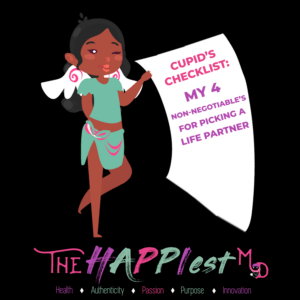
You Gon’ Learn Today: The Importance of Writing Your Own Life’s Narrative
“If I didn’t define myself for myself. I would be crunched into other people’s fantasies for me and eaten alive.” – Audre Lorde
This quote is one of my favorite quotes, because it really underscores why I believe that embracing authenticity is an important part of living your HAPPIest life! In other words, if you do not write your own life’s narrative, others will make attempts to write it for you. There will be statistics based on who you are and where you come from, media coverage that generally tells a story about people who look like you, stereotypes placed on you because someone knew someone similar to you in some way, and more opinions from others than you could possibly count. People will try to tell you who you are and what you are capable of, but deep down, you know yourself better than anyone else could. YOU have to write your own life’s narrative and share your own story. You have to let them know, “You gon’ learn today!”

Mission Driven-Planning
I have already written about the mission-driven methods of bullet journaling and time management, and writing your own life’s narrative takes mission-driven planning to the next level! Essentially, it requires that you create both a master plan and a brief biography for the life you want to live. In the bullet journaling post (see bullet journaling link above), I explained the creation of lifelong roles. These roles define how you want to live out your life’s mission and help you with planning your tasks and time to better support this journey. The master plan and biography are your ways to bring your lifelong roles to life, infusing immense power into the vision you have for your life’s journey!
The master plan is a visual timeline of your life and the goals you desire to achieve within each role. The timeline you set is up to you. I (the avid planner) like to plan on a year-by-year basis, because I always set age-related goals. My husband (the anti-planner) prefers to think of his life in chunks of five years at a time. Within each time period you set, you should briefly write out color-coded goals for each of your lifelong roles. This should be a brief phrase that embodies the goal, because the detailed planning will be deferred until you are preparing for each given time period. I recommend making your master plan one of your mission-driven bullet journal’s collections (again, see bullet journaling link above for details). This way, you can glance back at it from time to time for inspiration or guidance as needed. The most important word to remember in “master plan” is PLAN. I am a planner, but my husband’s go-with-the-flow attitude has truly helped me to be more flexible and graceful when it comes to adjusting my plans. Think of your master plan as a guiding blueprint that can be adapted to fit your life as you live it and learn more about yourself and your mission.
The biography is what you make of it. You can write your own introduction for you to get on stage and speak, letter of recommendation, brief spotlight in a magazine, obituary celebrating the life you will have lived, or any written form that you find inspiring. The only requirement is that you highlight your life’s mission and what life will sound like to others while you are accomplishing it. Personally, I like the speaker introduction approach, but I have also learned a lot from writing letters of recommendation. I have this mentor who has historically asked me to draft the first draft of my own letters of recommendation, which they would later edit and finalize. I initially felt so uncomfortable with the practice, because it felt wrong to give myself praise. My mentor taught me to focus on concrete examples rather than emotions or opinions, which they would later add in for their own personal touch. Instead of saying, “she’s a great…”, I could detail the things I have done and how I found meaning in them, and let other people draw their own conclusions. Thinking through my own narrative in this way allowed me to better understand core aspects of my professional and personal brands that I want to share with the world. That is the goal. Write something that helps you gain better clarity on and inspiration for the life you want to live.

Walking The Walk
Believe it or not, writing your own life’s narrative is the easy part! The hard part is doing your best to live out and embody the narrative that you have written for your life. You can’t just talk the talk, you also have to learn to walk that walk! This also means exploring the times when life itself inspires you to move in another direction that may be different from the plan you originally made. I will be on this journey alongside you, learning more and more every day how to walk my own walk as you learn to walk yours. Writing your life’s narrative is not intended to prevent you from ever being spontaneous, but rather, it’s meant to give you structure at baseline. The hope is that this structure will assist you in living out your life’s mission with more passion and purpose. Louis Pasteur is believed to have said the famous words, “Chance favors the prepared mind.” Writing your life’s narrative is the way to prepare yourself for the future and free your mind to take full advantage of the many opportunities life will bring. You got it! Walk that walk, my friend!
Believe it or not, writing your own life’s narrative is the easy part! The hard part is doing your best to live out and embody the narrative that you have written for your life. You can’t just talk the talk, you also have to learn to walk that walk!

With Love and HAPPIness,
The HAPPIest MD
P.S.
If you haven’t already, please see my other posts on mission-driven planning:
- My Mission & Me: The Mission-Driven Method of Bullet Journaling
- Not Today, Satan!: The Mission-Driven Method of Time Management




